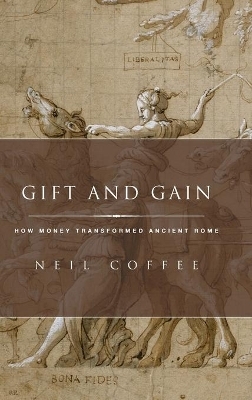
Gift and Gain
Oxford University Press Inc (Verlag)
978-0-19-049643-2 (ISBN)
The economy of ancient Rome, with its money, complex credit arrangements, and long-range shipping, was surprisingly modern. Yet Romans also exchanged goods and services within a robust system of gifts and favors, which sustained the supportive relationships necessary for survival in the absence of the extensive state and social institutions. In Gift and Gain: How Money Transformed Ancient Rome, Neil Coffee shows how a vibrant commercial culture progressively displaced systems of gift giving over the course of Rome's classical era. The change was propelled the Roman elite, through their engagement in shipping, moneylending, and other enterprises. Members of the same elite, however, remained habituated to traditional gift relationships, relying on them to exercise influence and build their social worlds. They resisted the transformation, through legislation, political movements, and philosophical argument. The result was a recurring clash across the contexts of Roman social and economic life. The book traces the conflict between gift and gain from Rome's prehistory, down through the conflicts of the late Republic, into the early Empire, showing its effects in areas as diverse as politics, government, legal representation, philosophical thought, public morality, personal and civic patronage, marriage, dining, and the Latin language. These investigations show Rome shifting, unevenly but steadily, away from its pre-historic reliance on relationships of mutual aid, and toward to the more formal, commercial, and contractual relations of modernity.
Neil Coffee is Associate Professor of Classics at the State University of New York at Buffalo. His interests include Latin poetry, Roman history, and digital humanities.
Table of Contents
List of Figures
Introduction
Chapter 1: Locating the Fault Line: Concepts and Scope
Part 1: The Middle Republic: Adaptation
Chapter 2: Looking Forward from Archaic Rome
Chapter 3: Adapting the Law in the Age of Cato
Chapter 4: Ideological Flexibility: Cato and Ennius
Chapter 5: Life Before Liberality: Plautus and Terence
Chapter 6: The Gracchi and the Failure of Collective Generosity
Part 2: The Late Republic: Exploitation
Chapter 7: Crooked Generosity in the Late Republic
Chapter 8: Cicero between Justice and Expediency
Chapter 9: Sallust and the Decline of Reciprocity
Chapter 10: Caesar's Wicked Gifts
Chapter 11: Atticus: Banker, Benefactor, Paragon
Part 3: The Early Empire: Separation
Chapter 12: Prying Worlds Apart: The Augustan Response
Chapter 13: Seneca's Philosophical Cure
Part 4: Conclusions
Chapter 14: Halfway to Modernity
Appendix
Bibliography
Index of Quoted Works
General Index
| Erscheinungsdatum | 29.12.2016 |
|---|---|
| Reihe/Serie | Classical Culture and Society |
| Verlagsort | New York |
| Sprache | englisch |
| Maße | 163 x 240 mm |
| Gewicht | 540 g |
| Themenwelt | Geschichte ► Allgemeine Geschichte ► Vor- und Frühgeschichte |
| Geisteswissenschaften ► Geschichte ► Regional- / Ländergeschichte | |
| Geschichte ► Teilgebiete der Geschichte ► Wirtschaftsgeschichte | |
| ISBN-10 | 0-19-049643-6 / 0190496436 |
| ISBN-13 | 978-0-19-049643-2 / 9780190496432 |
| Zustand | Neuware |
| Haben Sie eine Frage zum Produkt? |
aus dem Bereich


